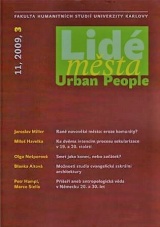Ke dvěma intencím procesu sekularizace v 19. a 20. století
DOI:
https://doi.org/10.14712/12128112.3640Klíčová slova:
secularisation, religion, modern religiosity, disenchantment of the world, Max WeberAbstrakt
The study emphasises the ambiguity of the concept of “secularisation” in modern social sciences and suggests a differentiation of the processes that are described by this term, i.e. the decline of religious institutions, secularisation in the sense of impropriation, spiritual or intellectual secularisation and decline in religiosity The hitherto ambiguity is put into the context of a two-fold, more profound understanding of religion: its conception as “compensation” and as “integration”. The author shows that the concept of “secularisation” must be distinguished from the concept of “the decline of religious institutions” and of “the disenchantment of the world”, which relate to the phenomena of secularisation, but should not be confused with them. For Max Weber, the core of the “disenchantment of the world” was not in the first place the change in religiosity, in the position of churches and the relations of religion and society, but in the cultural consequences of the unique Western process of the rationalisation of human life, the ability to calculate profits and the ability to technically manipulate the world of nature and, at that, human society. In this sense, the “disenchantment of the world” should be understood as designating a post-Enlightenment, or, respectively, a post-Kant attempt of placing of faith and religion into the private sphere of life, just as the ideas of good, beauty, hope or love were; Weber believes that science cannot tackle these concepts. The result is the relativism of values, which have become a solely subjective project, hallowed by one’s own self.
Stahování
Publikováno
Jak citovat
Číslo
Sekce
Licence

Tato práce je licencována pod Mezinárodní licencí Creative Commons Attribution-NonCommercial-NoDerivatives 4.0.


